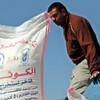
Karni and Kerem Shalom crossings have been open for nearly one week (21 - 27 March), although not at full capacity, allowing much needed basic food supplies to enter the Gaza Strip. Karni closed on 28 March because of heightened Israeli security concerns over the Knesset elections. Over the course of the last week, over 1,650 truckloads of food and commercial supplies entered the Gaza Strip through Karni crossing from Israel. Exported goods from the Gaza Strip were permitted on 26 March for the first time since 12 March. On 28 March, two Israeli Bedouins were killed in the nearby village of Nahal Oz when they reportedly handled an unexploded qassam rocket previously fired by Palestinian militants. Read more about Gaza Strip Situation Report
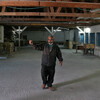
Following the closure of Karni, most bakeries in the Gaza Strip today are closed, because wheat flour stocks have finished. Bread is the staple food for 1.3 million Palestinians in Gaza. There are long lines of people outside the few bakeries that still have limited stocks of bread and the bakeries are rationing bread to those waiting. Gaza requires 450MT of wheat each day to maintain bread supplies.1 The usual 30-60 day wheat stock kept in Gaza is exhausted. Other basic food commodities are in extremely short supply including dairy products and fruit. Rice and sugar are selling at more than twice their normal price and are also very difficult to find in stores. Read more about The Humanitarian Impact of the Karni Crossing Closure: Bread running out in Gaza
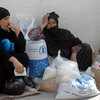
UN agencies and non-governmental organisations today are appealing for $215 million in emergency assistance for people in the occupied Palestinian territory. The reason for yet another Appeal in the occupied Palestinian territory - this is the fourth consecutive year - is because the humanitarian situation is largely unchanged. Poverty rates have increased in 2005 compared to 2004. Gaza, the northern and southern areas of the West Bank are the areas of most acute need. The Appeal is part of a global appeal of $4.7 billion launched by United Nations Secretary General Kofi Annan, for 18 countries and regions facing humanitarian crises. Read more about Emergency Appeal targets $215 million for poorest Palestinians
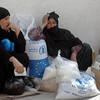
For the fourth consecutive year humanitarian agencies are appealing to donors for funding for the occupied Palestinian territory (oPt). The unfortunate need for yet another appeal stems from a largely unchanged humanitarian situation. Poverty rates have increased in 2005 compared to 2004, largely because the quality of work is lower and households’ coping mechanisms are increasingly fragile. Until improvements occur the need for humanitarian assistance remains crucial. Cutting back on assistance will put extreme stress on these already-stretched strategies and increase poverty. The total request to donors in 2006 is US$ 215 million down from US$ 302 million in 2005. Read more about UN seeks $215 million in aid for humanitarian aid in Palestine
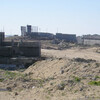
The withdrawal of Israeli forces from the Gaza Strip from the early hours of Monday 12 September 2005 has had an immediate and beneficial impact on the lives of the 1.4 million Gazan residents. The withdrawal of the IDF has resulted in the lifting of all internal closures within the Gaza Strip and has had a particular impact on the residents of the five Gaza enclaves: As Seafa, Al Mawasi, Al Ma’ani, Abu Nahia and Abu al Ajin. This report reviews the key changes to access that have occurred and a preliminary overview of the status of infrastructure. Read more about Gaza access and infrastructure
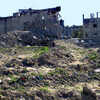
The Israeli Defence Forces (IDF) completed their withdrawal from Gaza at 7 am this morning. Operation Last Watch ended with a brief ceremony at Qissufim road crossing when the national flag was re-raised by Gaza Division troops on the Israeli side of the crossing. Palestinian National Security Forces progressively moved into the former settlements throughout Sunday night and into the early hours of this morning. In spite of their presence, synagogues were set ablaze in Netzarim, Kfar Darom and Morag by groups of Palestinians who followed behind the security forces. Read more about Gaza disengagement update
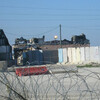
On Thursday a further 6 settlements were evacuated - Netzer Hazani, Gan Or, Shirat Hayam, Kfar Yam and significantly Neve Dekalim and Kfar Darom. On Friday, Israeli Police and IDF completed the evacuation of Gadid settlement directly to the south of Neve Dekalim. Following the end of Shabat, Katif and Atzmona were evacuated on Sunday along with a small group of hardline supporters that remained in Elei Sinai. Haaretz reported that 30 homes have now been demolished in Nissanit and Dugit. The demolitions in Dugit are due to be completed by this afternoon. Read more about Gaza situation report
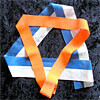
On 22 August, settlers marched up from Khomesh to Sa’nur along road 60 and attempted to enter the Palestinian villages of Silat adh Dhar, Al Fandaqumiya, al Asa ‘asa and ‘Ajja along the road. The settlers reportedly knocked on the doors of Palestinian trying to enter their homes. All movement into Israel proper for Palestinian workers and traders has been suspended, and will remain suspended until end of the disengagement. Family visits from the area to Palestinian prisoners held in Israel have been suspended. The Governor of Jenin has appealed to the UN and ICRC for a presence in the villages closest to the settlements such as Silat adh Dhahr, Al Fandaqumiya, Jaba’ and Al Asa’asa to show support for the Palestinian community and reassure them in the face of settler harassment. Read more about West Bank situation report
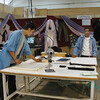
The continuing needs of thousands of Palestinian refugees residing in Syria have created new challenges, the Syrian General Authority for Palestine Arab Refugees (GAPAR) said at the opening of its annual conference in the capital, Damascus. Management from GAPAR, along with representatives from the United Nations Relief and Works Agency (UNRWA) are attending the conference from 15 to 18 August to review refugee needs and achievements thus far, and to plan ahead. According to GAPAR, the agencies will be focusing on the implementation of better infrastructure in the camps, including sewage systems, access to drinking water and maintenance of utilities. Read more about Palestinian refugees learn new skills at an UNRWA run centre in Damascus
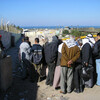
During March and the first half of April movement in and out of the Gaza Strip steadily improved. However, the situation detriorated during the latter part of April following restrictions on Palestinian movement through Erez and periodic closing of Abu Houli junction. Access problems remain with the internal Gaza Strip enclaves, most notably Al Mawasi and As Siafa while a fourth enclave has now been created at Abu Nahiya. In the last four weeks, the Israeli authorities have not allowed United Nations Relief and Works Agency (UNRWA) to import petrol into the Gaza Strip. Read more about Gaza Strip access deteriorates









